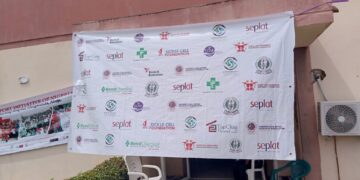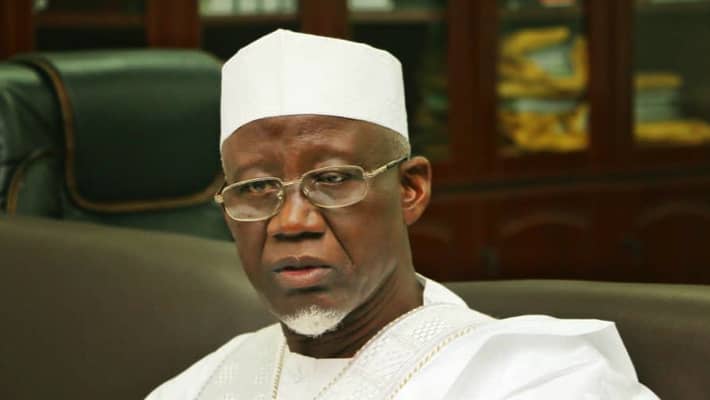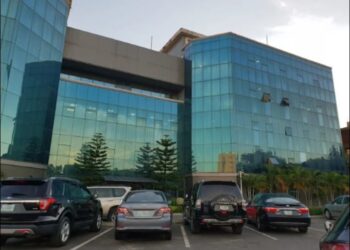The 2nd NPC-JICA Annual Kaizen Conference with the Theme: “Driving Overall Growth in Nigeria Through Continuous Improvement: The Kaizen Way”, was declared open by the Hon Minister of Labour and Employment yesterday, Thursday February 13, 2025. The conference was held in Zuma Hall, Rockview (Royale) Hotel, Abuja.
In his special remarks, Dr. Dingyadi commended the Japan International Cooperation Agency (JICA) for collaborating with the National Productivity Centre (NPC) to make the second Kaizen Conference a reality.
Addressing the participants, he said: “there is no gainsaying that the present administration inherited a very weak economy and that Nigeria is at a very critical stage in our nation’s history, a stage rife with daunting challenges: low-level productivity and competitiveness, low level of skilled and knowledge workers, over-dependence on crude oil, poor state of infrastructure, high rate of company shutdowns, high rate of graduate unemployment, poor quality products, etc.. When the foregoing is combined with the socio-economic ills like terrorism, banditry, kidnapping, etc., it becomes understandable why Nigeria ranked 64th out of 67 countries in the latest World Competitiveness Report.
The report also showed that Nigeria ranked low in government and business efficiency, with rankings of 61st out of 67 in productivity and efficiency, 64th out of 67 in technological infrastructure, 46th in attitudes and values, and 38th in management practices”.
Speaking on the choice of the central theme chosen for this conference, he said that “the theme, “Driving Overall Growth in Nigeria through Continuous Improvement: The Kaizen Way”, couldn’t have come at a better time – a time when the current administration, under the leadership of President Bola Ahmed Tinubu, has not only set an “8-Point Agenda”, but has fashioned out strategies, and currently implementing programmes and activities aimed at doubling our national output, diversifying our economy, building the nation’s production/manufacturing capacity and creating jobs for young Nigerians”.
Recognizing that the kind of change needed to meet the challenge of achieving the 8-point Agenda will require bold, creative leaps, the Hon Minister stated:
“That is why the current administration of President Bola Ahmed Tinubu has undertaken some interventions aimed at reviving the MSME sector and placing it on a trajectory for growth.” Some of these, he said, include “$800 million commitment to Power Substation and Distribution Upgrades to provide stable power supply and reduce energy costs for MSMEs; A six hundred and fifty billion naira (N650 billion) facility to provide lower-cost short-term facilities to youth-owned businesses, manufacturers and MSMEs across various industries; food processing, pharmaceutical, agriculture, and wholesale and retail trade; A Manufacturing Stabilization Fund that will rejuvenate up to two hundred and fifty companies and deliver lower cost (9.0%-11.0%) long-term facilities to large, medium-scale, and light manufacturers that produce finished goods for domestic and export markets; A Grow Nigeria Development Fund consisting of a single-digit interest rate loan portfolio with the Bank of Industry and a matching fund agreement with sub-national governments to grow MSMEs; Expanding the Bank of Industry’s Rural Development Programme which is a fund to support rural economies in developing 300 new MSMEs for each state, including the Federal Capital Territory (Abuja), resulting in 11,100 new rural-based MSMEs across the Federation”.
“We also recognise that in addition to the foregoing, the nation will require new management and operational thinking, new technology, and new ways of collaborating— a gradual approach to solving problems that is based on partnerships among industries, companies, governments, and research organizations.
“To this end, we recognize that the Kaizen/ Quality and Productivity Improvement (QPI) approach plays a catalytic role in transforming and enhancing key elements of competitiveness that are critical for the nation to attain its Industrialization aspirations as envisaged under Agenda 2030” he added.
On the benefits of Kaizen, the Minister explained:
“The benefits of embracing the Kaizen philosophy are manifold; they range from; reducing the unit cost of production by minimizing wastes along supply chains; improving the quality of products by reducing defects; to enhancing workers’ skills, creating decent workplaces; and strengthening the capability of firms to be globally competitive”.
Acknowledging that the Centre has deployed kaizen in some MSMEs across the country and that the practice of kaizen is critical to the realization of Manufacturing Value Added (MVA), he emphasized that “a lot more companies need to adopt it, so that Nigeria may reap its full potential – especially as Nigerian MSMEs hope to be competitive in the Africa Continental Free Trade Area (AFCFTA)”.
“I hope that this conference will serve as a reminder of the imperative for the participating organizations to address their inefficiencies, poor quality and high levels of wastes, so they may realise the opportunities presented by the Kaizen approach”, he said .
While declaring the conference open, he expressed his appreciation to the people of Japan for not only introducing this powerful philosophy but also for sharing it with the world.
Amongst the dignitaries present were the Hon Minister of Labour and Employment(FML&E), who was represented by the Permanent Secretary FML&E, Salihu A. Usman, PhD, the Director-General, National Productivity Centre, Dr. Baffa Babba Dan’Agundi, who was accompanied by his team of Directors, the Chief Representative of JICA, Nigeria Office, Yuzurio Susumu, Coordinator Kaizen NPC, Engr. Adejoh David, Ms. Sakura Ito JICA Nigeria Office, and the representative of the Managing Director/CEO, Abuja Enterprise Agency (AEA), Orji Stephen.
Over 90 participants drawn from both the public and private sector organizations organizations attended the conference.















